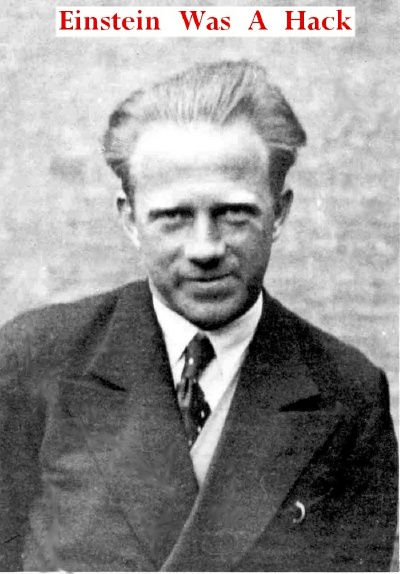Not everyone was convinced. Heisenberg, the uncertainty principle guy(1), only got his Ph.D. because his score was averaged out. He had to take an experimental physics course and part of the final grade was Q&A. He couldn't answer any of the questions one professor, Wilhelm Wien, asked, so Professor Wien threw him a bone; how does a battery work?
Heisenberg didn't even know that. His advisor, Arnold Sommerfeld, and Wien argued about whether or not this guy knew what he was talking about and they did what the United Nations does about everything; they split the difference. Sommerfeld gave him an A and Wien an F, and a III/C passed. His thinking didn't get much better in the early days, both Einstein and Popper dumped on him for metaphysics wandering.

Who's laughing now, Einstein? Well, still Einstein, since almost no one gets the uncertainly principle correct.
These days no one asks about the real world, you can make a whole career based on String Theory, even though it isn't a theory, all it took was to take classes and then get a job from someone whose career has been in String Theory.(2)
That's where we are at with Multiverse stuff today. It's not based in the real world, it's not even science, it is instead "metaphysics masquerading as science," writes Jim Baggott, who is to physics mumbo-jumbo what Greg Critser was to medical woo or Gary Taubes is to food. When theoretical physicists aren't dumping on actual physicists - the people who will have to prove their cosmic fantasies - they are writing multiverse and time junk over and over and over.
"In our post-truth age of casual lies, fake news and alternative facts, society is under extraordinary pressure from those pushing potentially dangerous antiscientific propaganda," Baggott writes, and makes a good point about what these supernatural physics about multiverses do to trust in all science.
Let’s acknowledge that theoretical physicists are perfectly entitled to believe, write and say whatever they want, within reason. But is it asking too much that they make their assertions with some honesty? Instead of ‘the multiverse exists’ and ‘it might be true’, is it really so difficult to say something like ‘the multiverse has some philosophical attractions, but it is highly speculative and controversial, and there is no evidence for it’?Why trust scientists on climate change or vaccines or GMOs when in the next article science media can be caught promoting metaphysics junk like the Mirrorverse?
Science is set apart from pseudoscience and metaphysics by being falsifiable. It can't be a science theory (as opposed to using Theory as part of a proper name) if it lacks the potential to be proved wrong.
And the multiverse can't be proved wrong because it is philosophy, it is science fiction, it is Futurama episodes - but it is not a theory.
It is, however, a terrific Sony Spider-Man movie.(3)
Read "But is it science?" by Jim Baggottt here.
NOTE:
(1) At the small level the measurement of position disturbs a particle's momentum. This is a manifestation of the "observer effect" but is often conflated with it, often by modern theoretical physicists who are more interested in time travel papers or pop science books about how weird the universe is than science.
(2) It has fallen far. In "The Big Bang Theory", the guy who purports to be the smartest was in String Theory, we can assume because it was the physics that Chuck Lorre and Bill Prady had heard of back then. Then he dumped it.
(3)



Comments